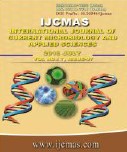


 National Academy of Agricultural Sciences (NAAS)
National Academy of Agricultural Sciences (NAAS)

|
PRINT ISSN : 2319-7692
Online ISSN : 2319-7706 Issues : 12 per year Publisher : Excellent Publishers Email : editorijcmas@gmail.com / submit@ijcmas.com Editor-in-chief: Dr.M.Prakash Index Copernicus ICV 2018: 95.39 NAAS RATING 2020: 5.38 |
Throughout the ages, plants have been a valuable resource of natural products for human health. All parts of the plant, from root to fruit, consisting of a multitude of secondary metabolites which impart an unprecedented variety of medicinal uses to the plant. Studies have shown the presence of different phytochemical constituents in botanical sample responsible for the antimicrobial activity. These antimicrobial agents should be beneficial to host cells and toxic to pathogenic microbes. Some medicinal plants and spices have been reported to exhibit antibacterial activity. Hence, the antibacterial activity was examined from the leaf of Moringa oleifera and Vitex negundo and petals of Rosa indica through agar disc diffusion method. Each sample was collected and its crude extract was obtained by using methanol and acetone as the extraction solvent. These extract were tested against two Gram positive (Bacillus cereus and Staphylococcus aureus) and one Gram negative bacteria (Salmonella typhi). The methanolic and acetonic extract of each M.oleifera, V.negundo and R. indica showed antibacterial activity against Bacillus cereus, Staphylococcus aureus and Salmonella typhi. Bio-chemical test for the presence of phytochemicals have shown positive result for tannin, flavonoid and alkaloid. These phytochemicals have ability to fight against microorganisms or inhibit the growth of microorganisms. This approach will be an advanced step in the discovery of some herbal drugs. These plant extracts which were proven to be potentially effective can be used as a natural alternative to the chemical preservatives frequently used in food preparations. It could be an ideal way to avoid health hazards that may occur due to chemical antimicrobial agents.
 |
 |
 |
 |
 |